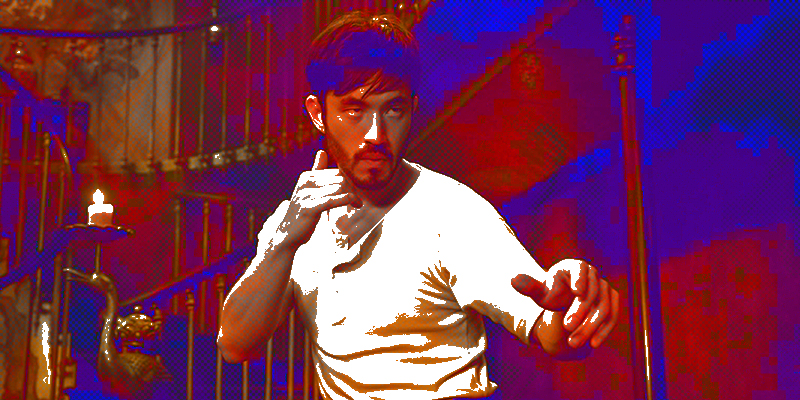Why aren’t more of you watching Warrior?!
It’s a question that keeps me up at night, along with “what is dark matter?” and “is a hot dog a sandwich?”
Warrior is everything you could want in a TV show. From the stellar cast to the vivid setting to the breakneck action, it is a perfectly bingeable roller coaster of drama and excitement.
For a show centered around martial arts, maybe it’s appropriate then, that Warrior has twice now been knocked down, gotten up, spit some teeth, and gotten back in the fight.
It premiered on Cinemax in 2019, but after two seasons, it was dropped. Max picked it up for the third season, which premiered in August of last year—but then they pulled the plug, too.
Now all three seasons are on Netflix… but a fourth season is not guaranteed.
And I need a fourth season! I won’t spoil what happens at the end of the third season but, bonds have been broken, characters are in peril. It’s a lot. I’m here to make my case that you should watch it.
Yes, this is a purely selfish endeavor. I am good with that.
Warrior is set during a pivotal moment in American history; the post-Civil War railroad era. It focuses more specifically on the Tong Wars in 1870s San Francisco. Chinese gangs are fighting over turf, drugs, brothels, and money, while the country is flooded with Chinese immigrants willing to work for cheap.
The business community loves this, of course, because they live to exploit workers if it means saving a few bucks. This generates conflicts with the Irish working class, many of whom are suddenly out of work.
It’s a racial powder keg, which the police force—also mostly Irish—struggles to keep a lid on. Meanwhile, various politicians are running various games to try and turn all this conflict to their advantage.
The story focuses on Ah Sahm, a gifted martial artist who arrives from China looking for his sister, Mai Ling. Shortly after arriving (and slapping around some sadistic immigration officials), he’s sold to one of Chinatown’s most powerful Tongs, the Hop Wei. And he soon learns that Mai Ling is a leader of that gang’s biggest rival, the Long Zii.
Oh, and Mai Ling is not happy to be found. Turns out there’s some bad blood between the two, which is not helped along by the sudden conflict in their allegiances.
This is a full-on kung-fu Western, based on an idea developed by Bruce Lee. As the story goes, while he was unsuccessful in pitching it, Warner Brothers just happened to come up with a show soon after, called Kung Fu and starring American actor David Carradine—about a Shaolin monk traveling the American west looking for his brother.
Funny how Hollywood works…
Anyway. Warrior is filled with with cool period costume and fictionalized versions of real-life figures, but it also does that great thing historical crime dramas can do: it shows us the bedrock on which some of today’s most divisive social issues were built (anti-Asian and anti-immigrant sentiment)—while reminding us how goddamn silly we are, that these things are still issues.
It’s got the politics and intrigue of Game of Thrones, just fewer dragons and way better fight scenes. I grew up on kung fu movies and I can tell you with supreme confidence, this show is legit. The directors, along with fight choreographer Brett Chan, understand the importance of shooting wide and minimizing the use of cuts, allowing the natural talent of the performer to shine in the course of delivering kinetic, brutal action.
It’s helped along even further by a killer cast. Andrew Koji plays Ah Sahm, with a megawatt smile and an easy charm, channeling some serious Bruce Lee energy. As deadly as he can be in a fight, Dianne Doan as Mai Ling is brilliant and calculating—and therefore, just as dangerous.
Ah Sahm’s chief rival, Li Yong, is played by Indonesian martial artist Joe Taslim, from The Raid and The Night Comes for Us. Mark Dacascos (Brotherhood of the Wolf, Iron Chef) also shows up in the third season, which, to me, is very exciting.
There isn’t a clunker in the ensemble, which runs deep, making it an incredible showcase for Asian actors.
But the Irish side is just as compelling. Kieran Bew plays Bill O’Hara, the beleaguered head of the Chinatown squad, whose gambling debts often put him in conflict with both sides.
And the show’s best villain has to be Dean Jagger, playing Dylan Leary, a labor unionist who rallies for the Irish workers, and gets into bareknuckle street fights for fun. He is despicable as he is charming.
I could do this all day, but one more special shoutout goes to Olivia Cheng as Ah Toy, who heads the local brothel, and is based on a real-life Chinatown madam. The women who work for her do so of their own free will—and at night she sneaks around Chinatown with a dao sword, freeing enslaved sex workers and avenging people within the community.
Speaking of Ah Toy, I get that historical shows can sometimes feel a little problematic. Yes, these are periods wherein social and sexual politics were not exactly polite, and female characters can often suffer in these contexts. I will say that while Warrior is certainly brutal and a show of its time, it treats women with dignity and agency, giving them plenty of room for complex storylines and kickass action.
The show even introduces queer characters; besides Ah Toy, there’s Hong, portrayed by Chen Tang. He is briefly ridiculed for being homosexual by other members of the Hop Wei—before Ah Sahm and his best friend Young Jun (Jason Tobin) step in to defend him, recognizing his skill and loyalty as more important than his sexuality.
I’m not going to say the show is completely free of cringe-inducing violence, but it definitely feels a lot less squidgy and tone-deaf than the average period drama.
One of the show’s more interesting style choices is how they handle the language barriers. Both Ah Sahm and Mai Ling learned English as children in China, but many of the other Chinese characters aren’t fluent. In some scenes, when they’re interacting with white actors, they’ll speak stilted English-as-a-second-language—until they’re along together, in which they speak in fluent English.
It’s an effective tool for communicating with the audience, often heightening the drama about who can understand what. But it also cuts down on the subtitles, and while I’m a fan of them (I’ll always take dialogue in a native language over a bad dub), I know they’re not for everyone.
The point is: Warrior is awesome. The storylines are compelling and complex. When you dig into them, you find a show about blood family, chosen family, loyalty, racial politics, sexual politics, politics politics, and America’s questionable and shameful histories with… a whole lot of things.
Then you get an entire episode devoted to an all-out war between the Irish and the Chinese on the streets of Chinatown.
You get to learn stuff and have fun.
Now it’s on Netflix. I am telling you with full confidence that it is worth watching.
Give it a try. Best case scenario: you find a good way to kill a weekend.
Better case scenario: the little-show-that-could picks itself up from the mat, bloodied and beaten, ready to go for a fourth season—and I get to find out what the hell happens after the bond-and-bone shattering events of the third season finale.

















